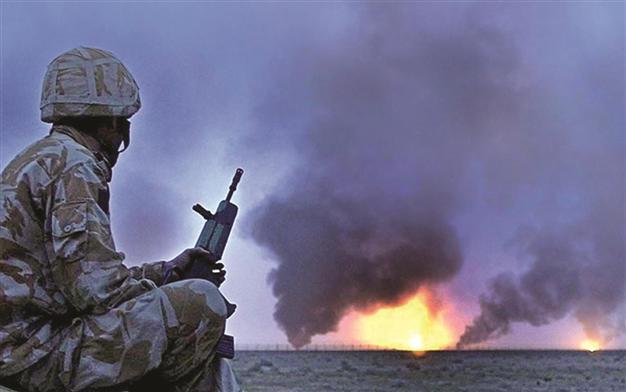US, UK intels ‘ignored’ WMD evidence in Iraq
LONDON

A British soldier watches burning oil wells in southern Iraq in this 2003 photo. At least 116,000 Iraqi civilians died in Iraq between 2003 and 2011. AFP Photo
British and U.S. intelligence officials were told through secret channels by Saddam Hussein’s foreign minister and his head of intelligence that Iraq had no active weapons of mass destruction (WMD) but they were ignored, according to a new investigation.A BBC Panorama program revealed yesterday how British and U.S. intelligence agencies were informed by top sources months before the invasion that Iraq had no active WMD program, and that the information was not passed to subsequent inquiries, British daily Guardian reported.
Iraq had ‘virtually nothing’
The program described how Naji Sabri, Hussein’s foreign minister, told the CIA’s station chief in Paris at the time, Bill Murray, that Iraq had “virtually nothing” in terms of WMD. Sabri denied the claims in a statement and said the story had been “totally fabricated.” However the program also confirmed that three months before the war an MI6 officer met Iraq’s head of intelligence, Tahir Habbush al-Tikriti, who also said Saddam had no active WMD.
The meeting in the Jordanian capital, Amman, took place days before the British government published its now widely discredited Iraqi weapons dossier in September 2002.
Lord Robin Butler, who conducted the 2004 inquiry into the intelligence used to justify the war, told the program that he was not told about Sabri’s comments, and that he should have been.
“There were ways in which people were misled or misled themselves at all stages,” the daily cited Butler as saying about the use of intelligence. “This was something which I think our review did miss.
But when we asked about it, we were told that it wasn’t a very significant fact, because SIS (Secret Intelligence Service) discounted it as something designed by Saddam to mislead.”
The program showed how the then chief of MI6, Sir Richard Dearlove, responded to information from Iraqi sources later acknowledged to be unreliable.
Uranium from Niger
The program said MI6 had stood by claims that Iraq was buying uranium from Niger, though these were dismissed by other intelligence agencies, including the French.
Ten years on the war, former British Prime Minister Tony Blair admitted that the situation in Iraq is “not nearly” what he hoped it would be when Britain joined the U.S.-led invasion to depose Saddam Hussein.
At least 116,000 Iraqi civilians and more than 4,800 coalition troops died in Iraq between the outbreak of war in 2003 and the U.S. withdrawal in 2011. Its involvement in Iraq has so far cost the United States $810 billion and could eventually reach $3 trillion.
















